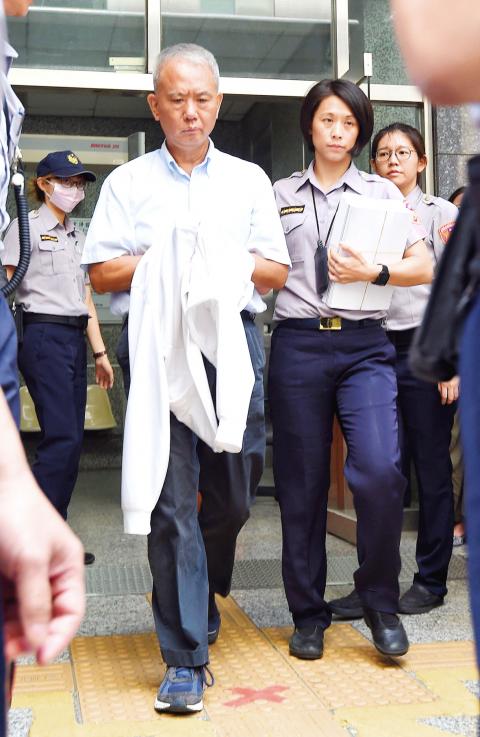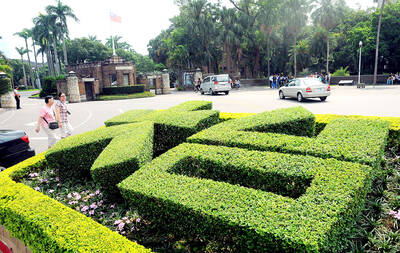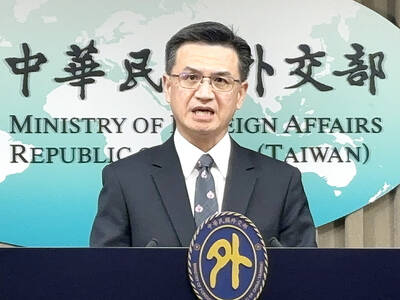Wei Ying-chung (魏應充), the former chairman of Ting Hsin Oil and Fat Industrial Co (頂新製油實業) and Wei Chuan Foods Corp (味全食品) who was found guilty of fraud in a tainted oil scandal exposed in 2013, yesterday began to serve his two-year prison term.
“Since this is God’s way of testing me, I will face it calmly... We should all walk away from hatred, antagonism and rumor-mongering. I want to thank all my friends and family, as well as employees, for their support throughout the trial and for believing in my innocence. Thank you,” Wei said as he reported to the Taipei District Prosecutors’ Office in the morning for transfer to Taipei Prison.
“Wei’s sentence is a warning issued by the justice system, but it is not the realization of justice,” Wei’s lawyer Yu Ming-hsien (余明賢) said.

Photo: Liu Hsin-de, Taipei Times
Wei is the third of four brothers who own Changhua County-based Ting Hsin International Group (頂新集團), which operates numerous food brands, including Master Kong (康師傅) instant noodles, Wei Chuan Foods and Dicos (德克士).
He took charge of the group’s cooking oil business and Wei Chuan in Taiwan before the scandal.
In late 2013, Ting Hsin Oil and Fat was found to have used tainted oil obtained from Chang Chi Foodstuff Co (大統長基) in its products since 2007.
Chang Chi mixed cottonseed oil and other cheap oils into its more expensive grape-seed and olive oil products, and in some cases added copper complex chlorophyllin, a colorant used to make the substitutes look more like olive oil.
In 2014, Ting Hsin Oil and Fat, along with Cheng I Food Co (正義油品), another firm previously headed by Wei, were found to have used gutter oil and imported oil meant for animal feed in its lard-based cooking oil products.
The oils were also used by Wei Chuan in its food products.
On Oct. 21, 2014, prosecutors indicted Wei, former Ting Hsin Oil and Fat president Chang Mei-feng (常梅峰) and former Wei Chuan president Chang Chiao-hua (張教華), along with several others, on charges of fraud, forgery and violations of food regulations.
Prosecutors said that Wei, in a bid to cut production costs, changed the formulas of the company’s 14 blended oil products, including one that used 98 percent cheap palm oil and only 1 percent or 2 percent olive or grape-seed oil, but marketed it as a premium class of blended oil.
Wei was originally sentenced to four years in prison by the Taipei District Court in a first trial in March last year, during which Chang was acquitted and the others were given prison terms ranging from five months to 46 months.
After an appeal by Wei, the Intellectual Property Court reduced his sentence to two years in a second trial in April last year.
The ruling is final and cannot be appealed, because prosecutors charged Wei and the other defendants with fraudulent labeling of products.
As a result, the case fell under the jurisdiction of the Intellectual Property Court, which found Wei and the other defendants not guilty of knowingly using adulterated oil obtained from Chang Chi.
There was insufficient evidence to show that Wei and the other defendants had knowledge of or could have reasonably foreseen the use of tainted oil, the Intellectual Property Court said.
As for Wei’s sale of substandard lard-based cooking oil, the Changhua District Court handed down a not-guilty ruling in November 2015. The prosecution has appealed that ruling.
Wei in 2014 resigned from his posts as chairman of Wei Chuan, Cheng I and Ting Hsin Oil and Fat.
Additional reporting by Jason Pan

Taiwan has experienced its most significant improvement in the QS World University Rankings by Subject, data provided on Sunday by international higher education analyst Quacquarelli Symonds (QS) showed. Compared with last year’s edition of the rankings, which measure academic excellence and influence, Taiwanese universities made great improvements in the H Index metric, which evaluates research productivity and its impact, with a notable 30 percent increase overall, QS said. Taiwanese universities also made notable progress in the Citations per Paper metric, which measures the impact of research, achieving a 13 percent increase. Taiwanese universities gained 10 percent in Academic Reputation, but declined 18 percent

Chinese President Xi Jinping (習近平) yesterday met with former president Ma Ying-jeou (馬英九) at the Great Hall of the People in Beijing, with Xi’s opening statement once more emphasizing that people on both sides of the Taiwan Strait are Chinese and that foreign intervention cannot change their inevitable unification. Xi said that 5,000 years of history of zhonghua minzu (中華民族, ethnic Chinese group) have seen their ancestors move to Taiwan to establish new lives, while also documenting them fighting side-by-side against foreign forces and finally freeing Taiwan. “Both sides are Chinese,” and there are no issues that cannot be worked through, he

BULLY TACTICS: Beijing has continued its incursions into Taiwan’s airspace even as Xi Jinping talked about Taiwan being part of the Chinese family and nation China should stop its coercion of Taiwan and respect mainstream public opinion in Taiwan about sovereignty if its expression of goodwill is genuine, the Ministry of Foreign Affairs (MOFA) said yesterday. Ministry spokesman Jeff Liu (劉永健) made the comment in response to media queries about a meeting between former president Ma Ying-jeou (馬英九) and Chinese President Xi Jinping (習近平) the previous day. Ma voiced support for the so-called “1992 consensus,” while Xi said that although the two sides of the Taiwan Strait have “different systems,” this does not change the fact that they are “part of the same country,” and that “external

UNDER DISCUSSION: The combatant command would integrate fast attack boat and anti-ship missile groups to defend waters closest to the coastline, a source said The military could establish a new combatant command as early as 2026, which would be tasked with defending Taiwan’s territorial waters 24 nautical miles (44.4km) from the nation’s coastline, a source familiar with the matter said yesterday. The new command, which would fall under the Naval Command Headquarters, would be led by a vice admiral and integrate existing fast attack boat and anti-ship missile groups, along with the Naval Maritime Surveillance and Reconnaissance Command, said the source, who asked to remain anonymous. It could be launched by 2026, but details are being discussed and no final timetable has been announced, the source